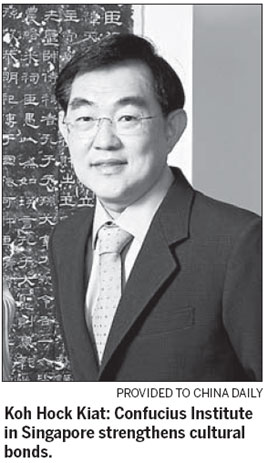Heritage
The best confucius institute in the world
Updated: 2011-09-25 15:01
By Pauline D Loh (China Daily)
Singapore
In Singapore, performance is measured in superlatives, and the Confucius Institute has the same yardstick.
Mooted as a joint venture with the think-tank Nanyang Technological University, the Confucius Institute-NTU was named "Confucius Institute of the Year" in 2010, in recognition of its excellent international Chinese teaching materials.
The man behind this award-winning effort is Koh Hock Kiat, a homegrown Singaporean who used to lecture Chinese language and culture at the country's National Institute of Education, an incubator for Singapore's flotilla of teachers.
Koh, 50, was headhunted to join the Confucius Institute-NTU as its director in 2005, and he sees his appointment as an excellent opportunity to learn how to manage and run a cultural institution.
And that is the keyword -- culture, and a deeper appreciation of all things Chinese. Unlike Confucius Institutes in most other countries, the one in Singapore has a different perspective. In a country where more than 70 percent of the population already speaks, reads or writes Chinese in varying degrees, the Institute is more a place where those interested in more advanced knowledge go.
 |
It has two key missions in Singapore: Break the language barrier and bridge the study of Chinese culture, arts and language within the Southeast Asia region and beyond.
According to Koh, the CI in Singapore sees its role as the "key organization to promoting Chinese culture".
"It works in tandem with government's policies to facilitate multi-disciplinary Chinese learning in Singapore. It also acts as a platform for international exchanges in promoting contemporary era Chinese language and culture," Koh explains.
The agenda here is dovetailed to fit Singapore's ambitions to brave the frontline in tapping the vast potential of the China market, and exploit the island nation's inherent advantage of having a population that can weave between Asian and Western cultures with ease to play an important facilitating role.
"Confucius Institute-NTU helps to elevate the level of Chinese language and culture in Singapore, as well as provide more opportunities for Chinese teachers in Singapore to study the Chinese language in depth."
Language courses offered at the Institute reflect these aims, like Business Chinese and Confucius Chinese. There are also two diploma courses designed to meet the needs of those interested in more advanced language skills.
These courses aim to better the ability for bilingual communication, interpretation and translation of Chinese documents, and help businessmen navigate the fog of Chinese business jargon and legalese.
To this end, the Institute aims to strengthen Singapore's Chinese language skills, provide Singaporeans with a platform to learn both the language and culture, and enhance the communication link between Singapore and other international Chinese communities.
The close ties between the Institute and its Chinese parent in Beijing also help foster better cooperation.
"We work very closely with the Confucius Institute headquarters in Beijing. We also have the Asia Confucius Institute conference and the World Confucius Institute International conference every year.
"All the directors have many opportunities to meet up to discuss important issues."
Koh himself was in Beijing recently for the book launch of The Lien Shih Sheng Collection published by the Peking University Press, in memory of a Singaporean literary figure for which a literature fund in the Confucius Institute is named.
You can contact the writer at paulined@chinadaily.com.cn.
E-paper

Pearl paradise
Dreams of a 'crazy' man turned out to be a real pearler for city
Literary beacon
Venice of china
Up to the mark
Specials

Power of profit
Western companies can learn from management practices of firms in emerging economies

Test of character
Keyboard-dependent Chinese are returning to school because they have forgotten how to write

Foreign-friendly skies
About a year ago, 48-year-old Roy Weinberg gave up his job with US Airways, moved to Shanghai and became a captain for China's Spring Airlines.
